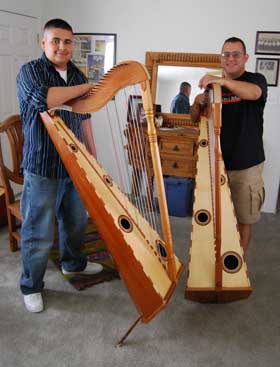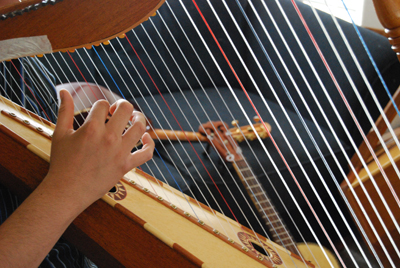 Wasco-based master musician and educator Juan Morales participated this year in ACTA’s Apprenticeship Program with Earlimart-based musician Erasmo Villarreal in Mexican arpa mariachera (mariachi-style harp).
Wasco-based master musician and educator Juan Morales participated this year in ACTA’s Apprenticeship Program with Earlimart-based musician Erasmo Villarreal in Mexican arpa mariachera (mariachi-style harp).
Morales first developed an interest in harp when delving into his Jarocho heritage as a youth while visiting his father’s homeland of Veracruz. “Although I learned to play other instruments before the harp, once I was able to afford one, it rapidly became my favorite one to play.” Purchasing his first harp as a teenager over twenty years ago, he studied harp from various street musicians in Guadalajara, as harp instruction did not exist in academic institutions. Soon after, upon settling in Arizona, he began intermittent studies for years with the late mariachi maestro Arturo Mendoza during Mendoza’s tours with his Mariachi Vargas alongside Nati Cano’s Mariachi Los Camperos. Morales’ talent eventually gave him the opportunity to play and tour with the latter group, in addition to Mariachi Sol de Mexico.
The mariachi harp, Morales describes, is “an intrinsic part of the mariachi culture” and at the turn of the twentieth century in Jalisco, was an essential instrument accompanying the guitarra de golpe and two violins to define a mariachi ensemble. Traditionally, the harp provides the fundamental bass line and harmonic accompaniment as well as melodic interjections alongside the violins. Over time, however, the harp’s role in mariachi ensemble playing has diminished, and today is more commonly played as a melodic and virtuosic instrument, its role in mariachi ensembles frequently replaced by the guitarrón. “As important as the role of the harp in the mariachi once was, very few people have ever even seen one of these beautiful instruments and I believe it is my responsibility to try to keep this cultural tradition from becoming extinct.”
One of the ways in which Morales has tried to keep the mariachi harp-playing traditions alive has been through an elective mariachi class in Delano at Delano High School, where he first met Villarreal as a freshman who enrolled in Morales’ class and continued his studies through his entire high school education, additionally developing accomplished proficiency in playing the guitarrón, vihuela, and guitarra de golpe from Morales, and playing both within the high school group and with other Kern County groups under Morales’ direction. Villarreal “has shown an unusually deep interest in the Mexican culture and the mariachi tradition as a whole,” Morales commented, “In my twenty years of teaching experience, he is one of the fastest learners that I have worked with, and has particularly demonstrated a marked easiness in the learning of the mariachi harp.”
 Participating in the Apprenticeship Program with a focus on harp enabled Villarreal to “help me to become a well-rounded armonia musician.” Reflecting on his studies with Morales during and beyond his high school years, he stated that Morales “has been able to teach me the culture, rather than just the music,” and has had the honor to meet mariachi greats, including Cano, members of Mariachi Vargas, and Jesus “Chuy” Guzman, through his teacher.
Participating in the Apprenticeship Program with a focus on harp enabled Villarreal to “help me to become a well-rounded armonia musician.” Reflecting on his studies with Morales during and beyond his high school years, he stated that Morales “has been able to teach me the culture, rather than just the music,” and has had the honor to meet mariachi greats, including Cano, members of Mariachi Vargas, and Jesus “Chuy” Guzman, through his teacher.
The apprenticeship followed the traditional way of transmitting music orally and by rote, with Morales demonstrating on the harp with Villarreal following during weekly lessons in Morales’ home. Additionally, Villarreal developed improvisation skills, learned how to interlock rhythmic patterns with the strumming patterns of the guitarra de golpe within an ensemble, and learned songs in different styles, including some harp solos. Emphasis was also placed on developing the bajos (bass line), and in strengthening Villarreal’s ring finger to play the bass lines at different octaves, as well as on techniques to sustain notes through the melody line.
Villarreal’s aspirations in mariachi music mirror that of Morales’ dedication to foster an emerging generation of mariachi musicians, which also include Morales’ three daughters. Together, Morales and Villarreal contribute critically to today’s vibrant mariachi traditions in the Central Valley. “I hope to be like Mr. Morales and develop a great knowledge in all the instruments to be able to be a versatile musician,” Villarreal comments. “I mostly expect to have a lot of fun because I love mariachi.”
